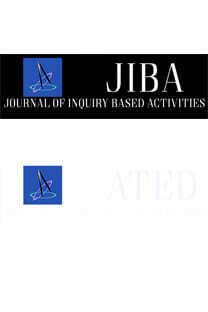ARGÜMANTASYONA DAYALI SORGULAMA YÖNTEMİNİN ELEKTRİK ENERJİSİ KONUSUNDA KULLANIMINA İLİŞKİN ETKİNLİK ÖRNEĞİ1
Bu çalışmada, fen derslerinde argümantasyona dayalı sorgulama yönteminin kullanımına ilişkin bir etkinliğin uygulama örneği ve uygulamanın öğrencilerin öğrenmeleri üzerindeki etkileri hakkında bilgilere yer verilmesi amaçlanmıştır. Bu amaçla 7. sınıf “Elektrik Enerji” ünitesi ampul parlaklığı ile direnç ilişkisi konusuna yönelik olarak “Seri Bağlı Devreyi İnceleyelim” etkinliği geliştirilmiştir. Geliştirilen etkinlik, 7. sınıfta öğrenim gören 32 öğrencinin katılımıyla fen bilimleri dersinde uygulanmıştır. Uygulamalar sonucunda öğrencilerin, seri bağlı devrelerde gerilim sabit iken ampul parlaklığı ile devrenin toplam direnci ve ampulün üzerinden geçen akım arasındaki ilişkiyi anlamlı şekilde öğrendikleri görülmüştür. Aynı zamanda öğrencilerde takımla çalışma, iletişim becerisi gibi becerilerin geliştiği belirlenmiştir. Bu çalışma sonucunda argümantasyona dayalı sorgulama yönteminin, (1) Fen bilimleri dersi kapsamında yer alan diğer ünitelerin öğretiminde de uygulanması ve öğrenci öğrenmeleri üzerindeki etkisinin belirlenmesi ve (2) Yirmi birinci yüzyıl becerileri kapsamında ele alınan yaratıcılık ve yenilikçilik gibi diğer becerilerin öğrencilere kazandırılmasındaki etkisinin belirlenmesine yönelik benzer çalışmaların gerçekleştirilmesi önerilebilir.
AN ACTIVITY RELATED TO THE USE OF ARGUMENTATION-DRIVEN INQUIRY METHODS IN ELECTRICITY ENERGY TOPIC
This study reports on the implementation of an activity that used argument-driven inquiry methods and its effects on students’ learning. “Let’s Examine the Serial Circuits” activity on the "Electricity Energy" unit was developed and implemented in a science lesson with the participation of 32 seventh grade students. As a result of participating in the activity, the students comprehended that the brightness of a lamp depends on the total resistance of the circuit and the current flowing through the lamp when the voltage is constant in series connected circuits. Also, the students improved their teamwork and communication skills. As a result of this study, we suggest (1) applying the argument-driven inquiry method to teach the other science units and examining the effects on student learning (2) determining the effects of the argument-driven inquiry method on the acquisition of other skills important in 21st century such as creativity and innovativation.
___
- Aktaş, T. (2017). Argümana dayalı sorgulama öğretiminin 7. sınıf öğrencilerinin kuvvet ve enerji ünitesindeki akademik başarılarına ve argümantasyon seviyelerine etkisi (Yayımlanmamış yüksek lisans tezi). Marmara Üniversitesi Eğitim Bilimleri Enstitüsü, İstanbul.
- Chen, H., Wang, H., Lu, Y., Lin, H., & Hong, Z. (2016). Using a modified argument-driven inquiry to promote elementary school students’ engagement in learning science and argumentation. International Journal of Science Education, 38(2), 170–191.
- Enderle, P., Grooms, J., & Sampson, V. (2013). Using argumentation in science education to promote the development of science proficiency: A comparative case study. Paper presented at Conference of the Society for Research on Educational Effectiveness (SREE), Washington, DC.
- Erenler, S. (2017). Argüman temelli sorgulayıcı araştırma uygulamalarının fen bilgisi öğretmen adaylarının üstbilişsel farkındalık düzeyine ve yazma becerilerine olan etkisinin incelenmesi (Yayımlanmamış yüksek lisans tezi). Abant İzzet Baysal Üniversitesi, Bolu.
- Milli Eğitim Bakanlığı. (2013). İlköğretim kurumları (ilkokullar ve ortaokullar) fen bilimleri dersi (3, 4, 5, 6, 7 ve 8. sınıflar) öğretim programı. Ankara: Talim ve Terbiye Kurulu Başkanlığı.
- National Research Council. (2010). Exploring the intersection of science education and 21st century skills: A workshop summary. Margaret Hilton, Rapporteur. Board on Science Education, Center for Education, Division of Behavioral and Social Sciences and Education. Washington, DC: National Academies Press.
- Sampson, V., Carafano, P., Enderle, P., Fannin, S., Grooms, J., Southerland, S. A., Stallworth, C., & Williams, K. (2014). Argument-driven inquiry in chemistry: Lab investigations for grades 9-12. Arlington, VA: NSTA Press.
- Sampson, V., Enderle, P., Grooms, J., & Witte, S. (2013). Writing to learn and learning to write during the school science laboratory: Helping middle and high school students develop argumentative writing skills as they learn core ideas. Science Education, 97(5), 643-670.
- Sampson, V., & Gleim, L. (2009). Argument-driven inquiry to promote the understanding of important concepts practices in biology. The American Biology Teacher, 71(8), 465-472.
- Sampson, V., Grooms J., & Walker, J. (2009). Argument-driven inquiry: A way to promote learning during laboratory activities. The Science Teacher, 76(7), 42-47.
- Sampson, V., Grooms, J., & Walker, J. (2011). Argument-driven inquiry as a way to help students learn how to participate in scientific argumentation and craft written arguments: An exploratory study. Science Education, 95(2), 217 –257.
- Sampson V., & Scheigh, S. (2013). Scientific argumentation in biology: 30 classroom activities. Arlington, VA: NSTA Press.
- Sampson, V., & Walker, J. (2012). Argument-driven inquiry as a way to help undergraduate students write to learn by learning to write in chemistry. International Journal of Science Education, 34(10), 1443 – 1485.
- Walker, J. P., Sampson, V., Grooms, J., Anderson, B., & Zimmerman, C. O. (2012). Argument-driven inquiry in undergraduate chemistry labs: The impact on students’ conceptual understanding, argument skills, and attitudes toward science. Journal of College Science Teaching, 41(4), 74-81.
- Wallace, C. S., Hand, B., & Prain, V. (2004). Writing and learning in the science classroom. Boston: Kluwer Academic Publishers.
- ISSN: 2146-5711
- Yayın Aralığı: Yılda 2 Sayı
- Başlangıç: 2011
- Yayıncı: Evrim Erbilgin
